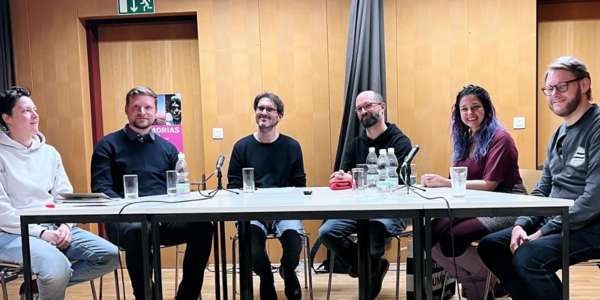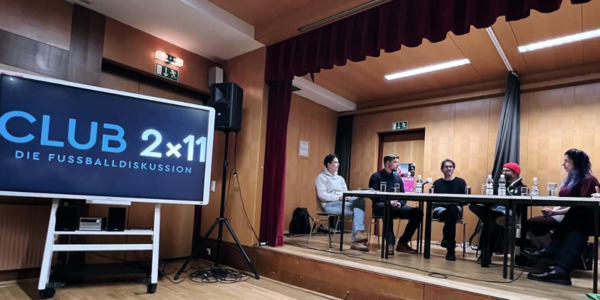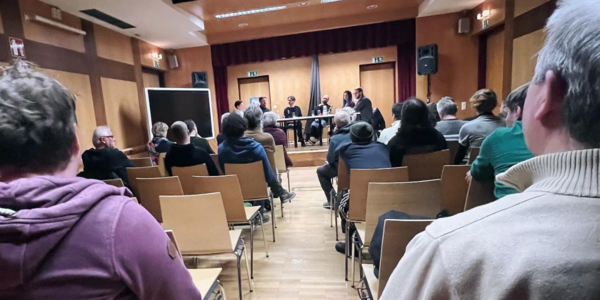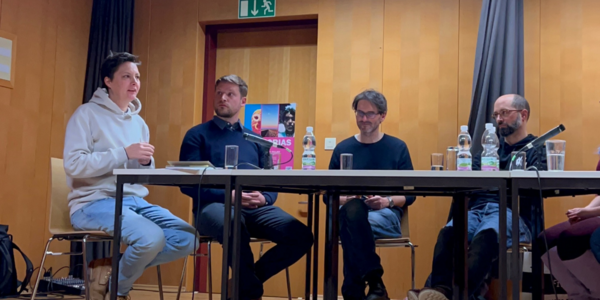Club 2x11 "Antisemitism in football" – Follow-up report
As part of the project fairplay prevention - contact point against misanthropic ideologies, Club 2x11 addressed the topic of antisemitism in football on 4 December. A topic that has become sadly topical since the Hamas attacks on Israel on 7 October 2022.
For more than an hour, Pavel Brunssen (antisemitism researcher), Amber Weinber (former chairwoman of the Forum against Antisemitism), Agnes Meisinger (co-curator of the exhibition "Superjuden. Jewish Identity in Football Stadiums" at the Jewish Museum Vienna), Daniel Shaked (photographer, former Maccabi Vienna player) and Sebastian Schönbauer (friends of the Friedhofstribüne) answered questions from Georg Spitaler (political scientist and historian).
https://www.fairplay.or.at/en/archive/club-2x11-anti-semitism-in-football-follow-up-report#top
At the beginning of the discussion, Pavel Brunssen gave an insight into the results of his research and explained the five forms of antisemitism categorised by him, as they also appear in football. He noted "[...] that antisemitism in football is also always anti-Semitism around football." This means that antisemitism in football is carried out of the stadium via TV broadcasts or by fans, among other things, thereby expanding the social field of football.
Amber Weinber, the initiator of the forum against antisemitism, which included a reporting option for antisemitic incidents, spoke about her experiences with antisemitic incidents in football. Jewish clubs and players in particular use the reporting option very frequently due to the weekly repetition of incidents at matches. "There was hardly a match without antisemitic incidents - whether on the pitch, in the changing room or from referees and officials."
https://www.fairplay.or.at/en/archive/club-2x11-anti-semitism-in-football-follow-up-report#top
Daniel Shaked, who played football for Maccabi Vienna in his youth and told the audience about an antisemitic incident and the dramatic consequences for himself and his colleagues after the game, took the same line.
Amber Weinber and Daniel Shaked as well as Sebastian Schönbauer from the Friends of the Cemetery Stand agreed with the statement that associations and clubs have a particular responsibility to prevent antisemitism on and around the football pitch and to take effective measures. After all, social commitment often comes from fan groups or individuals in the club environment. Schönbauer says: "Everything that happens in the area of anti-racism, anti-homophobia or in the fight against antisemitism never actually happens voluntarily from the associations or clubs, but always only under pressure."
https://www.fairplay.or.at/en/archive/club-2x11-anti-semitism-in-football-follow-up-report#top
At this point, Pavel Brunssen added to the positive experiences he had made as part of the NOA project (Networks Overcoming Antisemitism) in December 2022. At that time, numerous players in Austrian football (ÖFB, Bundesliga and Bundesliga clubs) took the time to get involved in a two-day workshop on antisemitism. "An important movement would be for football as a whole, but above all the institutions, to understand that taking a stand against antisemitism does not always have to be associated with negative events and a reaction to incidents." Instead, it should be a basic human attitude.
https://www.fairplay.or.at/en/archive/club-2x11-anti-semitism-in-football-follow-up-report#top
The Jewish Museum Vienna is currently hosting the special exhibition "Super Jews - Jewish Identity in Football Stadiums", which portrays five football clubs (Austria Vienna, First Vienna, Bayern Munich, Ajax Amsterdam and Tottenham Hotspur). Curator Agnes Meisinger provided insights into the conception of the exhibition and explained the extent to which the topic of antisemitism played a role in it. The central question was: "How do the fan groups deal with the Jewish history of their own club?"
fairplay recommends a visit to the exhibition, which runs until 14 January!
In conclusion, all panellists agreed that the fight against antisemitism must be supported by all those involved in football: preventative measures in the clubs, the formulation of guiding principles or a critical examination of the club's history can certainly help to reduce antisemitic resentment on and around the football pitch.
https://www.fairplay.or.at/en/archive/club-2x11-anti-semitism-in-football-follow-up-report#top
https://www.fairplay.or.at/en/archive/club-2x11-anti-semitism-in-football-follow-up-report#top






